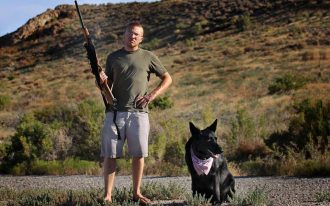Why breed-specific legislation will not solve the problem
By Georges R. Dupras, WestmountMag.ca
Much has been written about breed specific legislation in the aftermath of the tragic death of Christine Vadnais. I am deeply troubled by her loss and extend my sincere regrets to her family. We are told that she died as a result of being mauled by an aggressive dog whose lineage was questionable.
The death or injury to anyone, including another animal, by a dangerous creature must be taken seriously and, in the case of a dog, beginning with the owner. I’m not of the opinion that just because a dog bites, that it should be euthanized. In most cases the bite was a reaction to a treatment that the dog wasn’t expecting – often by a child. At a recent meeting, one longtime dog trainer stated that methods used by various individuals to determine if a dog was prone to violence so differ in their application as to be inconclusive. Depending on the evaluator, even the most passive and social dog might react by biting. Incidents such as the one in the Christine Vadnais case are more animal specific than they are breed particular.
Profiling canines
We condemn race profiling, at least in our every day vernacular, but accept species profiling when dealing with non-humans. This we do despite the views and recommendations of subject specialists such as trainers, owners, the Quebec order of Veterinarians, humane societies, kennel clubs, etc.
Violent society
We live in a violent society that has grown numb to wife battering, child abuse, discrimination, murder, suicide and random shootings. In the case of hunting accidents, the hunters that are killed are few compared to the number of animals dragged out of our forests every year. Despite this, if one bear kills one hunter, its front-page news across the continent, if not the world. I can’t but wonder if we haven’t lost our perspective.
Knee-jerk reaction
If a dog, any dog, attacked a member of my family, I would without a doubt, take whatever action I could to protect that person. This is not to say that I would condemn an entire breed because of the actions of one dog.
People first
There are those who argue “people first” in cases such as the Christine Vadnais death. This isn’t an either/or situation, but rather one of social responsibility. Breed-specific legislation is a political reaction directed at a longstanding social problem. Show me an aggressive attack dog and I’ll show you an owner of the same character. Show me a child abuser and I’ll show you an adult who was abused as a child. Show me a wife beater and I’ll show you a man that was raised in an abusive context that victimizes everyone – and the dance goes on.
Beyond the non-human primate
The either/or argument has been used throughout our history to justify all manner of cruelty and death. It has been a bench cry over the ages to rationalize genocide, the suppression of different races, theological beliefs, gender orientation, politics, the destruction of our environment and the loss of countless species with whom we once shared this planet.
The true cause
By outlawing a specific breed, do we resolve the issue of brutal attacks, or do we simply encourage those who are excited by violence to seek out other breeds? Why do we permit aggressive character conditioning, if not to turn a blind eye on the growing problem of social violence? Do our lawmakers, despite quantifiable evidence, not recognize that animal abuse and brutal conditioning lead to abuses against children, and other vulnerable populations?
Changes in animal protection will protect humans as well
Thanks to covert groups such as the Outdoor Caucus in Ottawa (see my article Why modernizing animal protection laws fail to pass), effective laws to protect animals, and by extension people, have not been enacted. Regardless of jurisdiction, it is easier to condemn the symptom than it is to confront the cause head-on.
Animal control issues are simple enough to address. Unfortunately, some of our political leaders are less concerned about our safety than they are about what “special interests” in Ottawa, or elsewhere, see as the thin edge of the wedge.
Cause versus effect
In child development, parental influence is a key factor in that development. The child often reflects the values and social conduct of its parents. This influence, or training, also applies to dogs. Owners who chain dogs in solitary environments, and train them in a manner that encourages violence, are the problem, and we who allow this to happen, are equal in blame. The problem is not the breed of the dog. Authorities who do not recognize this reality and do not act must share the blame themselves.

